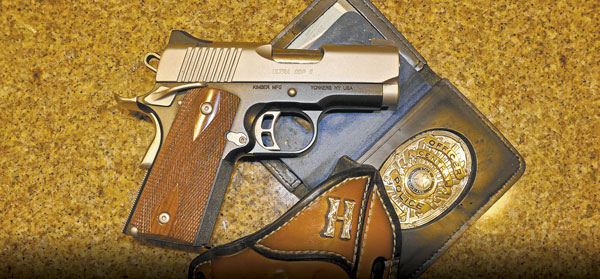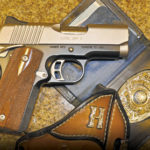
Move part of research plan to improve waterfowl habitat, agency says.
If you carry concealed, several things have changed since the 2010 legislative session of which you should be aware.
The law was “tweaked” slightly by the legislature, and some administrative changes were introduced by the Louisiana State Police Concealed Handgun Permit Section.
We’ve gotten panicky messages from permit holders that their permit either has expired, or is about to expire, and they weren’t notified by the LSP Concealed Permit Section.
With some 40,000 permit holders, it was becoming a financial burden and a labor-intensive chore to mail out reminders of expiring permits every month. The section operates on self-generated funds from the sale of the permits, and operational costs were getting out of hand.
So the practice of mailing out reminders was ended. A number of folks complained, but how difficult is it to look at your permit and remember the expiration date?
The state police give you a 60-day grace period upon expiration of your permit — your permit will be expired on the anniversary of the day it was issued, but you have 60 days AFTER that date, and it is still considered a renewal permit.
This means you will not have to be re-fingerprinted, turn in any previous divorce records, court records, military separation papers or medical-excuse forms that you turned in with your first-time application. All of these need be submitted only once — with the first-time application.
If you turn in your application to renew your permit within the 60-day grace period, you will only have to fill out the application packet and turn it in.
If you go past the 60-day grace period, your file is shredded, and you will be treated like a new applicant, having to turn in all the extra background information you submitted the first time.
However, if none of the other information applies — if all you had to do the first time was be fingerprinted — unless something has changed in your background, you will only be required to be fingerprinted again, and your permit will be renewed.
I explain this to panicked permit holders at least once weekly.
August is the cutoff month for the 4,100 people who were Louisiana residents and carried under a Florida Non-Resident Concealed Handgun Permit.
The legislature tweaked the law in the 2010 legislative session, and ended the practice of recognizing non-resident permits from other states.
In the case of Florida, from which most Louisiana residents received their non-resident permits, the permits were issued by the Department of Licensing, they required a less intensive training regimen and the Florida permits were good for seven years.
Since Louisiana recognized Florida permits, no distinction was made between resident and non-resident permits, and the non-resident permits were recognized as legal permits to carry in Louisiana.
At one time there was a legitimate reason to obtain a Florida non-resident permit instead of a Louisiana resident permit.
If you were a resident of North Louisiana and made frequent trips into Arkansas, your Louisiana concealed handgun permit was not recognized by the state of Arkansas.
Like many states, Arkansas requires a concealed permit to carry a loaded gun in the vehicle. Arkansas recognized Florida’s permits, thus many North Louisiana residents obtained a Florida non-resident permit to allow them to keep their loaded guns in their vehicles once they passed the state line leaving Louisiana and entering Arkansas.
Now, of course, Arkansas recognizes Louisiana’s permit, so the Florida non-resident permit is not necessary.
Further, Louisiana’s permit is now recognized by about as many states as Florida’s — so the old excuse of Florida being accepted by four or five more states is no longer valid.
The legislature recognized that Florida issues its non-resident permits to out-of-state visitors to allow them to carry in the state of Florida.
Florida does not recognize non-resident permits issued by other states. In other words, if you want to carry in Florida, you better have a permit issued by your home state, or a non-resident permit issued by Florida in your name.
The legislature also realized that once the Department of Licensing in Florida issued their non-resident permit, that department had no way of keeping track of the permit holders. Such a person could go out the same day and commit a felony crime, and continue carrying their Florida permit for seven years until they came up for renewal, and a background check was conducted.
Thus, in the 2010 legislative session, the Louisiana legislature ended the recognition of non-resident concealed-carry permits by Louisiana residents. Anyone from any other state would be allowed to carry with their non-resident permit, but Louisiana residents would be required to get a Louisiana concealed-handgun permit.
Louisiana residents currently carrying with a non-resident permit from another state would be grandfathered in for one year. No further recognition of such permits would be allowed.
Thus, anyone who is a Louisiana resident and has a non-resident permit from another state will have to take the training and get a Louisiana permit. Their non-resident permit will not be legal after Aug. 15.
Another tweak was lobbied by the Louisiana Shooting Association (www.louisianashooting.com), which has positioned itself as the state firearms association. The LSA monitors the legislature, and through the use of lobbyists, protects the 2nd Amendment rights of Louisiana shooters.
The LSA recognized a weakness in the existing law, and lobbied to have it changed.
Under the old statute, a person could not carry a firearm within 1,000 feet of a school campus or on a school campus.
The LSA pointed out to the legislature that there were municipalities in the state where it was impossible to NOT be within 1,000 feet of a school campus. The legislature listened, and adjusted
the law.
Now, a concealed carry permit holder MAY carry his firearm on his person, with his concealed permit license, within 1,000 feet of a school campus, as long as he does not enter the campus proper.
This corrects the weakness the LSA recognized in the law — that a concealed carry permit holder might easily be walking his dog, or get out of his vehicle to change a flat tire, and unknowingly be within 1,000 feet of a school campus.
Now, with the changes in the statute, that person will no longer be in violation of the law.
The legislature recognized that the most law-abiding sub-culture in the United States is concealed carry permit holders — these people do not commit crimes, and are not a danger to society. It is therefore no danger to a school or its campus to allow Louisiana concealed permit holders to carry within 1,000 feet of the campus.




